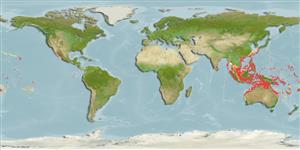Teleostei (teleosts) >
Eupercaria/misc (Various families in series Eupercaria) >
Labridae (Wrasses) > Corinae
Etymology: Halichoeres: Greek, als, alis = salt + Greek, choiros = pig (Ref. 45335).
More on author: Randall.
Environment: milieu / climate zone / depth range / distribution range
Ecology
Marine; reef-associated; depth range 2 - 70 m (Ref. 90102), usually 15 - 60 m (Ref. 27115). Tropical; 24°C - 27°C (Ref. 27115); 32°N - 32°S
Eastern Indian Ocean: Christmas Island. Western Pacific: Solomon Islands, north to southern Japan, south to Rowley Shoals and New South Wales (Australia). Recently reported from Tonga (Ref. 53797). Replaced by Halichoeres leucoxanthus in the Indian Ocean, but with overlapping distributions in Indonesia (Ref. 37816).
Size / Weight / Age
Maturity: Lm ? range ? - ? cm
Max length : 12.0 cm TL male/unsexed; (Ref. 2334)
Dorsal spines (total): 9; Dorsal soft rays (total): 12; Anal spines: 3; Anal soft rays: 11 - 12; Vertebrae: 25. In life, body bright yellow, head and thorax yellow-orange; a spot behind eye; head with irregular light-green bands. Dorsal fin of males with a large black, white-rimmed spot at the first interspinous membrane (another spot may appear on the soft portion between 2nd and 3rd rays for smaller males); females with a second black, light yellow-rimmed spot; smaller females and juveniles with a third blackish spot on penultimate membrane. Anterior lateral line scales with 2-4 pores; 6-12 suborbital pores. Pelvic fins not reaching anus.
Found at the reef edge, in sand and rubble areas (Ref. 9710) usually in small groups (Ref. 90102).
Life cycle and mating behavior
Maturity | Reproduction | Spawning | Eggs | Fecundity | Larvae
Distinct pairing during breeding (Ref. 205).
Randall, J.E., G.R. Allen and R.C. Steene, 1990. Fishes of the Great Barrier Reef and Coral Sea. University of Hawaii Press, Honolulu, Hawaii. 506 p. (Ref. 2334)
IUCN Red List Status (Ref. 130435: Version 2024-1)
Threat to humans
Harmless
Human uses
Fisheries: commercial; aquarium: commercial
Tools
Special reports
Download XML
Internet sources
Estimates based on models
Preferred temperature (Ref.
123201): 25.2 - 28.9, mean 27.7 °C (based on 662 cells).
Phylogenetic diversity index (Ref.
82804): PD
50 = 0.5000 [Uniqueness, from 0.5 = low to 2.0 = high].
Bayesian length-weight: a=0.00977 (0.00468 - 0.02039), b=3.09 (2.92 - 3.26), in cm total length, based on LWR estimates for this Genus-body shape (Ref.
93245).
Trophic level (Ref.
69278): 3.4 ±0.5 se; based on size and trophs of closest relatives
Resilience (Ref.
120179): High, minimum population doubling time less than 15 months (Preliminary K or Fecundity.).
Fishing Vulnerability (Ref.
59153): Low vulnerability (10 of 100).
Nutrients (Ref.
124155): Calcium = 97.2 [58.1, 171.5] mg/100g; Iron = 0.782 [0.459, 1.453] mg/100g; Protein = 18.4 [15.5, 20.6] %; Omega3 = 0.178 [0.111, 0.283] g/100g; Selenium = 27.2 [16.0, 49.4] μg/100g; VitaminA = 147 [45, 555] μg/100g; Zinc = 1.8 [1.2, 2.8] mg/100g (wet weight);
